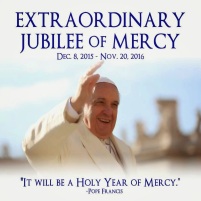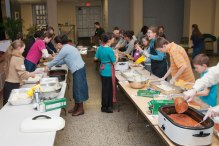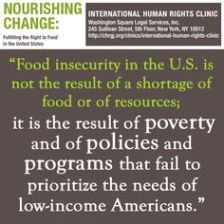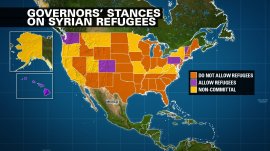 Last March Pope Francis declared an extraordinary Jubilee, a Holy Year of Mercy. No question that the world needs compassion, forgiveness, and mercy! But I found myself a bit concerned: wouldn’t highlighting mercy lead to the Spiritual and Corporal Works of Mercy — all fourteen of which focus on people? Might this not reinforce a tendency to the anthropocentrism that the pope would later lament in his encyclical Laudato Si’? Further, the Works of Mercy have traditionally been more concerned with charity than with addressing the causes of the need for charity. Whether or not the pope was thinking of those fourteen works of mercy, how do we interpret them in light of this newly-understood interconnection of all creation and the need for global justice?
Last March Pope Francis declared an extraordinary Jubilee, a Holy Year of Mercy. No question that the world needs compassion, forgiveness, and mercy! But I found myself a bit concerned: wouldn’t highlighting mercy lead to the Spiritual and Corporal Works of Mercy — all fourteen of which focus on people? Might this not reinforce a tendency to the anthropocentrism that the pope would later lament in his encyclical Laudato Si’? Further, the Works of Mercy have traditionally been more concerned with charity than with addressing the causes of the need for charity. Whether or not the pope was thinking of those fourteen works of mercy, how do we interpret them in light of this newly-understood interconnection of all creation and the need for global justice?
If we believe that the name of God is Mercy, it follows that Mercy (aka God) lives and acts in all creation, with no exclusions. We cannot care for people without caring for our common home. Deepening our awareness of the loving forgiveness and mercy of God/ Mercy propels us to make connections: humans with the rest of creation, mercy with justice.
Works of Mercy
 In Matthew 25, Jesus lists the ultimate tests for being accepted into the kingdom: “Then he shall say to them … Come, you who are blessed by my Father … for I was hungry and you gave me food, I was thirsty and you gave me something to drink … Truly I tell you, just as you did it to one of the least of these, you did it to me.”
In Matthew 25, Jesus lists the ultimate tests for being accepted into the kingdom: “Then he shall say to them … Come, you who are blessed by my Father … for I was hungry and you gave me food, I was thirsty and you gave me something to drink … Truly I tell you, just as you did it to one of the least of these, you did it to me.”
The Church eventually listed seven essential Spiritual Works of Mercy, and seven Corporal Works:
Counsel the doubtful Feed the hungry
Teach those who lack knowledge Give drink to the thirsty
Admonish sinners Clothe the naked
Comfort the afflicted Welcome the stranger
Forgive those who hurt us Visit the sick
Bear patiently with those who do us ill Visit the imprisoned
Pray for the living and the dead Bury the dead
Seen originally as person-to-person relationships, we now realize that “Everything is related, and we human beings are united as brothers and sisters on a wonderful pilgrimage, woven together by the love God has for each of his [sic] creatures and which also unites us in fond affection with brother sun, sister moon, brother river and mother earth.” Laudato Si’, par. 92
Making Connections
 Seen in the light of redressing causes, working for justice, and interconnecting with all of creation, these works take on even greater relevance. Feeding the hungry and giving drink to the thirsty, for example, are impossible when soil and water are seriously polluted and/or when climate change results in droughts or floods or salination or species extinction. Justice is also a factor, for food quality and availability are often endangered by laws that benefit corporations at the expense soil and farmers and the hungry who need healthful food.
Seen in the light of redressing causes, working for justice, and interconnecting with all of creation, these works take on even greater relevance. Feeding the hungry and giving drink to the thirsty, for example, are impossible when soil and water are seriously polluted and/or when climate change results in droughts or floods or salination or species extinction. Justice is also a factor, for food quality and availability are often endangered by laws that benefit corporations at the expense soil and farmers and the hungry who need healthful food.
The saying goes that if you teach a man to fish, you feed him for a lifetime — but not if the fish stock is depleted by overfishing or climate disruption, if his access is usurped by big industry, the water is polluted, etc. And what about job availability and just wages to allow the workers and the hungry to purchase food?
Of course Christians want to welcome the stranger. Whatever we do to the least, we do to Christ. But take a look at the states where governors have said strangers are not welcome. How are we addressing the causes of and solutions to this lack of welcome? What are we doing to stop the causes — climate change, wars, persecution — that drive millions to leave their homes and flee to an uncertain future?
Integral Ecology
In Laudato Si’, Pope Francis devotes one of his five chapters to “Integral Ecology.” Try substituting “the works of mercy” for “the analysis of environmental problems” in this quote from par. 141: “Today, [the analysis of environmental problems] cannot be separated from the analysis of human, family, work-related and urban contexts, nor from how individuals relate to themselves, which leads in turn to how they relate to others and to the environment.”
The first sentence of Pope Francis’ declaration of the Year of Mercy provides the key to unlocking connections: “The call of Jesus pushes each of us never to stop at the surface of things, especially when we are dealing with a person.” Let’s look below and beyond and all around the Works of Mercy to see how they interconnect with everything else — and what we can do about it.
.

Inspiring, thanks. Mary H
LikeLike
Thanks, Mary. Certainly nothing new to you!
LikeLike
Hi Terri,
Terrific statement. And I quite agree.
We just finished our General Chapter 2016 [ … ] The enactments and strategies are strong.
Your work is so important at this time.
Carol
LikeLike
Carol, I rejoice with you! Adrians have always been at the forefront, and you have always had super leaders. I cannot imagine what will be in your future with the new ones! You must be ecstatic! I’ll watch for enactments and strategies on your site; they will inspire us all! XXOO
LikeLike
Hi, Terri, it’s “me again”! I just want to applaud you for your reflection on Mercy and Integral Ecology. Your blog was terrific, and I especially liked your suggestion to substitute the words “the works of mercy” for “the analysis of environmental problems”. Love and prayers, AJ
LikeLike
You are so dear to add that positive comment, AJ. It means a lot to me that you, who have always inspired me, find it helpful. XXOO
LikeLike
Many thanks, Terri! I will include your perspective in the Associate Newsletter articles I write this year on Associates who are “agents of mercy.”
LikeLike
I am honored, Judy!
LikeLike